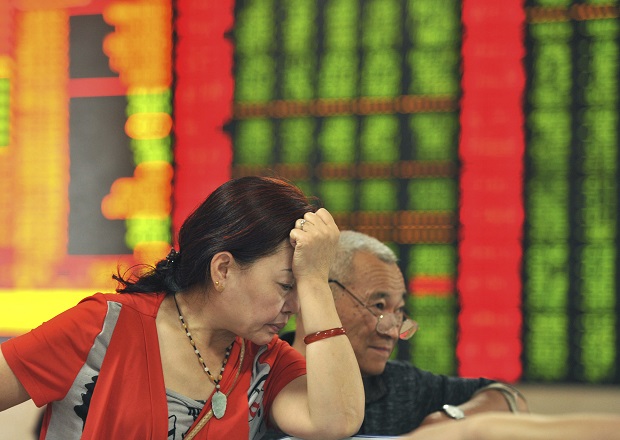Fear or greed? China share plunge splits bulls and bears

Investors react as they check stock prices in a brokerage house in Fuyang in central China’s Anhui province Friday, June 26, 2015. Chinese stocks plunged on Friday as panicked investors rushed to sell over fears that an extended bull market was coming to an end. AP
BEIJING, China – When China’s main share index hit a seven-year high two weeks ago, it topped off a run that had seen it soar more than 150 percent over the previous 12 months, high among the world’s best performers.
But in the two weeks since, it has suffered a huge reversal, plummeting nearly 20 percent and wiping trillions of yuan off market capitalizations.
Analysts are divided on whether the flood of minus signs on price screens signals the end of the spectacular bull market, or is merely a temporary correction in a debt-fueled upward march.
The benchmark Shanghai Composite Index slumped 7.4 percent on Friday to 4,192.87, nearly 1,000 points and 18.8 percent off its high.
The tech-heavy Shenzhen Composite, which tracks stocks on China’s second exchange — tumbled 7.9 percent, taking it 20.3 percent down from its peak and putting it into bear market territory.
On Saturday China’s central bank announced interest rate cuts of 0.25 percentage points and reduced some reserve requirement ratios — limits on the amounts banks can lend — by 0.50 percentage points.
Analysts say that as well as seeking to stimulate slowing growth, the move was also a response to the market turmoil.
“It allows the PBoC to ease policy to boost the sluggish economy while sending a policy signal that authorities do not want to see a bear equity market, either,” ANZ economists wrote in a research note.
But US investment bank Morgan Stanley has already advised clients to refrain from buying mainland shares.
“This is probably not a dip to buy,” wrote Jonathan Garner, its Hong Kong head of Asia and emerging-market strategy, according to Bloomberg News. “In fact, we think the balance of probabilities is that the top for the cycle… has now taken place.”
Haitong Securities strategist Zhang Qi was more optimistic, telling AFP: “I reckon it is a correction in a bull market. The scale of the correction is quite significant now but the time span is not long enough yet” to signal the end of the bull market.